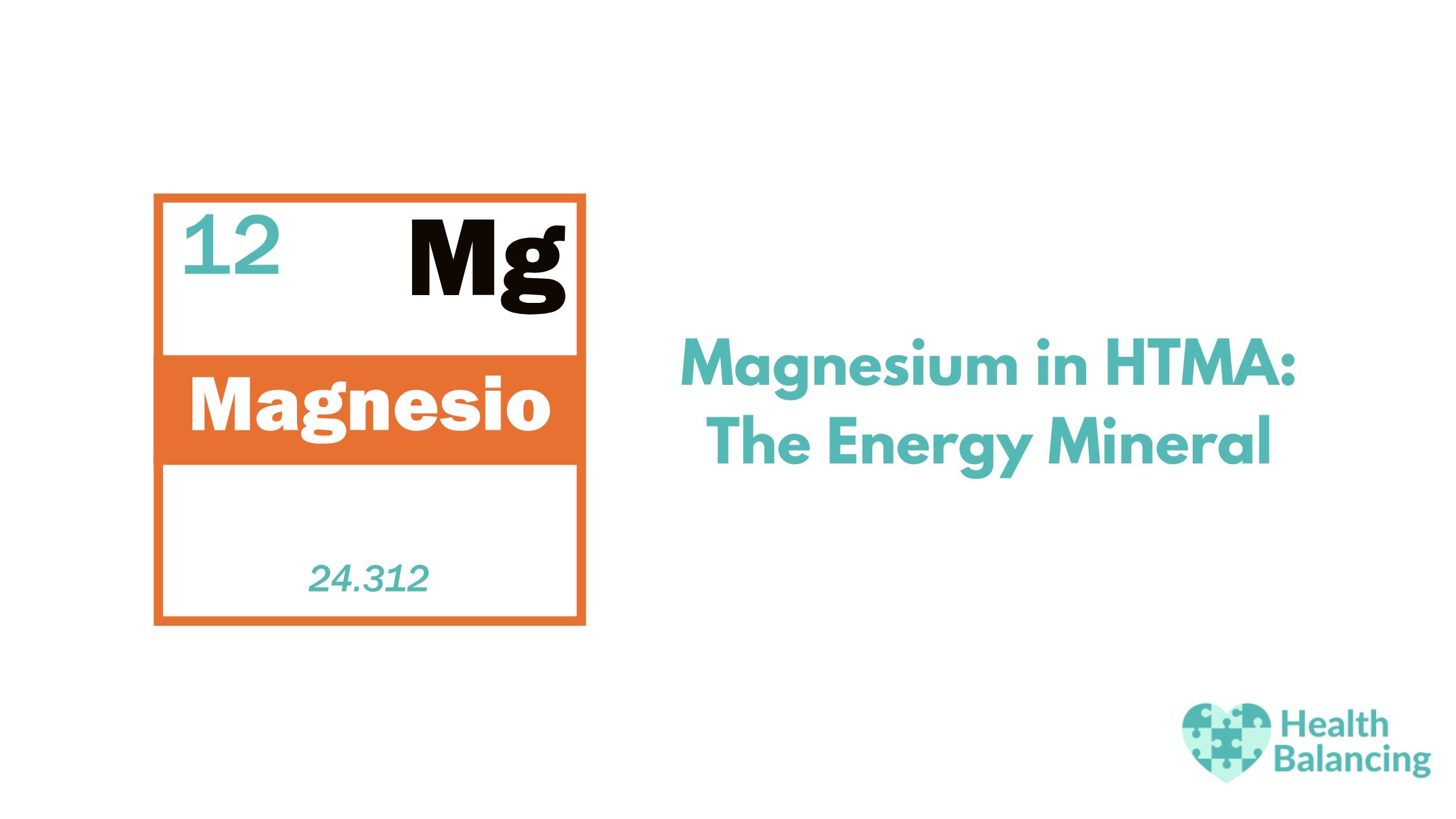Magnesium is a vital mineral cofactor involved in both aerobic and anaerobic energy production. It plays a central role in the function of the mitochondria—the cell’s “powerhouse”—where it supports the creation and utilization of ATP, the body’s main energy currency. One of magnesium’s critical actions is its oxygen-sparing effect, helping cells generate energy more efficiently. Because it is required for hundreds of enzymatic reactions, especially those tied to metabolism, even a slight magnesium deficiency can significantly impact energy levels, stress response, and overall cellular performance. Unfortunately, magnesium deficiency is common today due to factors like poor diet, stress, alcohol use, certain medications, and modern farming practices that deplete soil minerals.
Calcium and magnesium should always exist in proper balance with one another. An elevated calcium-to-magnesium (Ca/Mg) ratio often signals a relative magnesium deficiency, even if magnesium levels in the hair appear high. This imbalance can lead to excessive calcium deposition in soft tissues, muscular tension, kidney stones, and compromised magnesium function. HTMA is uniquely suited to detect both absolute and relative magnesium deficiencies, offering a more accurate picture than blood tests alone.
Why Magnesium Matters in the Body
Sixty percent of the body’s magnesium is stored in the bones, with the remaining portion found within cells. Magnesium plays a role in countless vital functions:
- Nervous system: Maintains nerve conduction and supports stress regulation.
- Muscles: Required for proper muscle contraction and prevents tissue calcification.
- Metabolism: Essential for glucose and fat metabolism, energy production, and protein synthesis.
- Detoxification: Aids liver function and helps protect against heavy metal toxicity.
- Skeletal system: Required for bone formation and supports calcium balance.
- Excretory system: Prevents kidney stones and regulates fluid retention.
- Digestive system: Acts as a natural laxative in excess.
Dietary Sources of Magnesium
Getting enough magnesium through your diet is critical. Top sources include:
- Nuts: Almonds, Brazil nuts, cashews
- Vegetables: Soybeans, parsnips
- Grains: Buckwheat, wheat bran, wheat germ, and other whole grains
- Other sources: Molasses, brewer’s yeast, kelp, chocolate, cocoa
What Magnesium Levels Mean in HTMA
HTMA provides insights into how magnesium is being metabolized and utilized in the body:
Low Hair Magnesium:
- Often found in fast oxidizers, associated with anxiety, hyperactivity, and irritability.
- May reflect a true deficiency or increased demand due to stress.
High Hair Magnesium:
- Common in slow oxidizers and individuals with fatigue or depression.
- May indicate biounavailable magnesium, meaning it’s accumulating in the tissues but not usable by the body.
Biounavailable Magnesium and ‘Amigo’ Forms When hair magnesium levels exceed about 10 mg%, it often exists in an unusable form—typically as an oxide or other compound. This “amigo” magnesium can be irritating and pro-oxidant, meaning it causes inflammation rather than preventing it. Although it’s a defense mechanism to stimulate depleted adrenal glands, it can lead to symptoms like:
- Fibromyalgia or other chronic pain
- Irritability and anxiety
- Insomnia and sleep disturbances
- Muscle weakness or cramps (especially after exercise)
- Depression
Magnesium, Oxidation Rate, and Stress Response
- Fast Oxidizers tend to have low magnesium levels in the hair relative to sodium and potassium. These individuals burn through minerals rapidly and may benefit greatly from magnesium supplementation.
- Slow Oxidizers often have higher magnesium in the hair, but it may be biounavailable. This contributes to fatigue, low thyroid activity, and sluggish metabolism.
- The ideal hair calcium-to-magnesium ratio is 6.67:1. As this ratio increases, the likelihood of magnesium deficiency symptoms increases—especially in slow oxidizers.
- High Ca/Mg ratios in slow types are often paired with high Na/K (stress) ratios, intensifying adrenal responses and depleting cellular magnesium reserves.
What Affects Magnesium Status?
Factors that impair magnesium absorption or utilization include:
- Phytates in grains
- Fluoride and excess phosphorus
- Alcohol consumption
- Junk food diets
- Low protein intake
Nutrients that work with or against magnesium:
- Synergists: Vitamin D, potassium, high-protein diets (in moderation), lactic acid, lactose, zinc, taurine, and vitamin B6
- Antagonists: Calcium (in excess), fluoride, sugar, alcohol
Deficiencies of zinc, taurine, and vitamin B6—common in high-carb diets—can also impair magnesium retention and promote biounavailability.
Magnesium, Estrogen, and Drug-Induced Deficiency
Estrogen—whether through birth control or HRT—promotes high Ca/Mg ratios and copper dominance, suppressing potassium and leading to relative magnesium deficiency. This hormonal imbalance slows metabolism and increases stress responses, especially in women.
Prescription drugs also deplete magnesium, including:
- Stimulants like Ritalin and Adderall
- Diuretics for high blood pressure
- Calcium channel blockers
These drugs can mask or exacerbate magnesium deficiency, contributing to cardiovascular and neurological risks.
The Judge: A Psychological Factor in Magnesium Loss
According to HTMA researcher and psychologist Dr. Rick Malter, stress activates an internal psychological entity known as the “Judge.” This inner critic amplifies anxiety, tension, and emotional reactivity, which in turn depletes cellular magnesium. By becoming aware of and working to quiet the Judge, individuals may reduce internal stress and improve magnesium retention. This psycho-biological link emphasizes that healing magnesium deficiency isn’t just nutritional—it’s also emotional.
Reasons for Magnesium Supplementation
Based on HTMA results, magnesium supplementation may be recommended to:
- Prevent calcium build-up in soft tissues
- Improve energy production (especially in fast oxidizers)
- Support adrenal function by raising low sodium levels
- Alleviate symptoms like anxiety, muscle cramps, and poor sleep
- Counteract hormonal and drug-induced depletion
HTMA: A Deeper Look at Magnesium Metabolism
The hair magnesium level and its ratios with calcium, sodium, and potassium reveal patterns far beyond a simple deficiency or surplus. They reflect deeper insights into:
- Adrenal and thyroid activity
- Blood sugar balance
- Nervous system stress
- Detoxification status
With magnesium playing such a foundational role in the body’s stress response, energy production, and mineral balance, your HTMA results offer a powerful tool for personalization.
Understanding your magnesium status through HTMA goes beyond symptoms—it provides the missing puzzle piece to rebalance your metabolism, calm your nervous system, and reclaim your energy.

